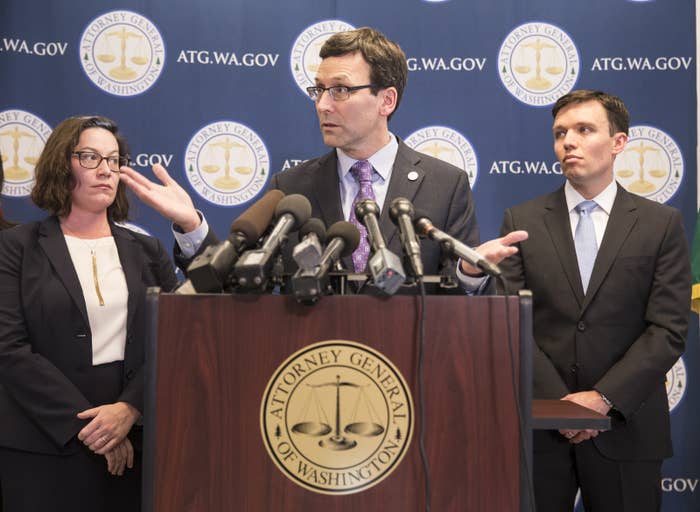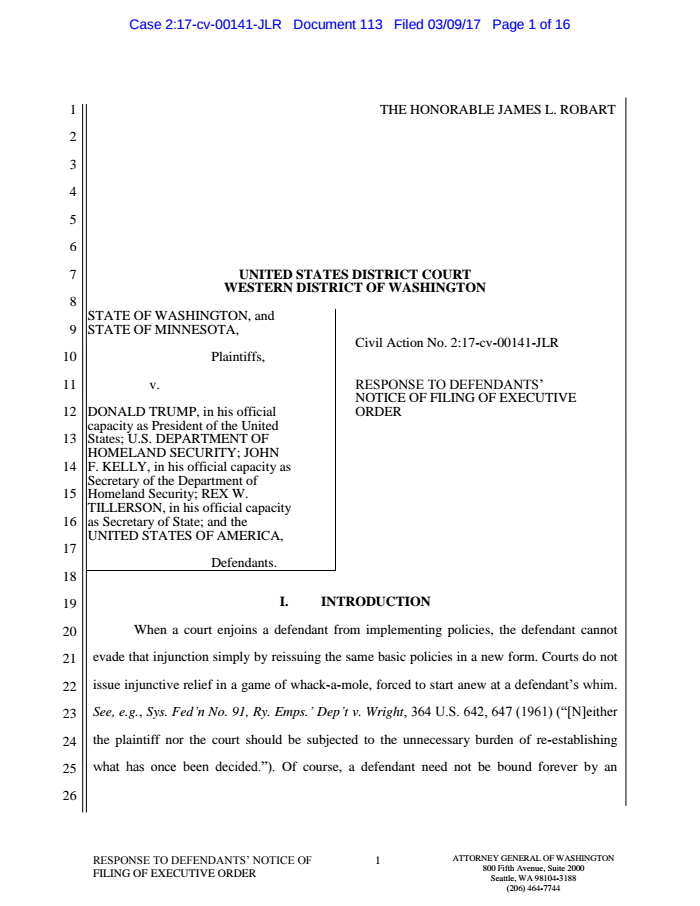
WASHINGTON — The state of Washington is continuing its lawsuit against the Trump administration, Washington Attorney General Bob Ferguson announced on Thursday, arguing in a court filing that the prior injunction issued against the January executive order applies to major portions of the new order President Trump signed on Monday.
"The President cannot unilaterally declare himself free of this Court’s injunction and reinstate policies that this Court already enjoined," Ferguson argued in the Thursday evening court filing.
Ferguson said at a news conference earlier in the day that he continues to believe that "what the president is doing is unconstitutional."
The attorney general said that the state would be "seeking to confirm" from US District Judge James Robart that the injunction he issued against the initial executive order on Feb. 3 remains in place. Robart's order halted enforcement of major portions of Trump's Jan. 27 executive order, commonly referred to as the travel and refugee ban.
Colleen Melody, the chief of the Washington office's civil rights division, explained that the state would be seeking to confirm that the February order from Robart continues to bar implementation of "provisions that have been re-implemented in the new order." Specifically, she said, the two main provisions contained in the original executive order that are in the new executive order in similar form should not be able to be enforced because they were among the provisions previously enjoined from being enforced.
The state would be seeking Robart's confirmation that the original injunction applies to the new order, Washington Solicitor General Noah Purcell said, in a response to the notice submitted by the Justice Department earlier this week regarding the issuance of the new executive order.
The state filed its response a little before 9 p.m. Eastern Time, highlighting its argument as such:
On February 3, this Court enjoined key provisions of Executive Order No. 13769 (First Executive Order). The Ninth Circuit unequivocally rejected President Trump’s request to stay or narrow this Court’s injunction. Nonetheless, on March 6, President Trump signed a new Executive Order (Second Executive Order) that, in the words of his own senior advisers, adopts “the same basic policy” as the first: “the goal is obviously to maintain the way that we did it the first time.” In particular, the policy purports to reinstate two provisions of the prior order that this Court enjoined: (1) a 90-day ban on entry of persons from several Muslim-majority countries, and (2) a 120-day suspension of the U.S. Refugee Admissions Program.
The Washington Attorney General's Office took particular umbrage at the Justice Department's statement in its Monday "notice" filing — which informed the court of the new executive order — that “[t]his Court’s injunctive order does not limit [his] ability to immediately begin enforcing the [Second Executive Order]."
Washington's lawyers counter: "Saying it does not make it so. While this assertion may be in keeping with the President’s position that courts are powerless to review his executive orders related to immigration, it is utterly inconsistent with basic legal principles."
Washington's lawyers ask Robart to "confirm that its injunction" applies to the travel ban provision and the refugee ban provisions in the new executive order "and direct Defendants to file a motion for modification if they wish to enforce those provisions."
Shortly after the Washington filing, Minnesota Attorney General Lori Swanson — who had joined Washington's lawsuit in February — filed a shorter, but just as blunt, response to the Justice Department's notice.
"The appropriate procedure ... is for Defendants to file a motion to modify the preliminary injunction if they seek to change it," Minnesota's lawyers wrote in part.
In addition to Minnesota, Ferguson also announced Thursday that attorneys general from Oregon and New York would be seeking to join the Washington-state-led effort. Robart granted the request for Oregon to intervene — which had been filed on Feb. 22 — on Thursday. Later Thursday, the Massachusetts Attorney General's Office announced they, too, would be seeking to join the case.
Asked why he believes Washington's lawsuit needs to continue in light of the fact that other litigation — including the restraining order being sought by Hawaii against the new ban — exists now, Ferguson said, "[W]hat we're asserting is, we've already got one, it's already in place."
The state will seek its confirmation that the original injunction applies to the new order, Washington Solicitor General Noah Purcell said, in a response to the notice submitted by the Justice Department earlier this week regarding the issuance of the new executive order.
"The bottom line is that there still are a number of people in Washington who are harmed," Purcell said, regarding questions about whether the state continues to have legal standing to sue.
Ferguson dodged when asked if he would seek a contempt order if the Trump administration attempts to enforce the new order without permission from Robart.
"We're intensely focused on what's right before us," Ferguson said, noting that his lawyers were still working on Thursday's planned filing and adding that the state will be filing an amended complaint next week to address the changes in the new order.
"We've won in court, and the president has had to honor those defeats," Ferguson said, returning to his repeated statements that the case is about the rule of law. "You cannot tweet your way out of it."

